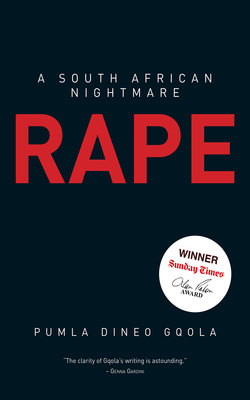Читать книгу Rape - Pumla Dineo Gqola - Страница 1
ОглавлениеI believe that in South Africa as in any other place in the world, an honest discussion about sexual assault, women’s oppression and women’s safety needs to begin with how we raise men. I’d like to move beyond the developed world’s approach to teaching women to empower themselves because – as I once announced to a room full of appalled first-world feminists – telling women to end rape is like telling black people to end racism. It seems counter-productive to me. When your child comes home from school after being bullied it’s best to address the bully’s behaviour instead of wondering what your child can do to stop it. There are basic behaviour patterns that need to be completely altered. Much of what we need to do, I think, lies in what boys learn – from both men and women – as they grow up.
– KAGISO LESEGO MOLOPE, NOVELIST
Physical pain aside, the enduring trauma of rape is that, like slavery, it makes of a person a thing. It denies human subjectivity. Despite every effort, it is impossible not to replay the memory of this over and over again in one’s mind. In the absence of therapeutic alternatives, the only way to resolve this vicious cycle and restore her status as a subject is to de-objectify the rapist to argue ‘it was all a mistake’ or even ‘I didn’t really mind’. Thus denial on the part of a rape victim can occur as a result of both the rape and the repeated trauma of remembering her rape.
– YVETTE ABRAHAMS, WOMEN AND GENDER STUDIES DEPARTMENT, UWC
To what extent is it even possible to resist and transform the social languages into which we are born? More to the point, how does one challenge the gendered norms that lead to the formation and sanctioning of patriarchal and violent masculinities?
– HELENE STRAUSS, UNIVERSITY OF THE FREE STATE
